Related Research Articles

The Channel Islands are an archipelago in the English Channel, off the French coast of Normandy. They are divided into two Crown Dependencies: the Bailiwick of Jersey, which is the largest of the islands; and the Bailiwick of Guernsey, consisting of Guernsey, Alderney, Sark, Herm and some smaller islands. Historically, they are the remnants of the Duchy of Normandy. Although they are not part of the United Kingdom, the UK is responsible for the defence and international relations of the islands as it is for the other Crown Dependency, the Isle of Man, and the British Overseas Territories. The Crown Dependencies are neither members of the Commonwealth of Nations, nor part of the European Union. They have a total population of about 171,916, and the bailiwicks' capitals, Saint Helier and Saint Peter Port, have populations of 33,500 and 18,207 respectively.
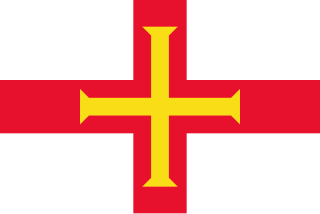
Guernsey is the second-largest island in the Channel Islands, located 27 miles (43 km) west of the Cotentin Peninsula, Normandy. It is the largest island in the Bailiwick of Guernsey, which includes five other inhabited islands – Alderney, Herm, Jethou, Lihou and Sark – and many small islets and rocks. The bailiwick has a population of 63,950, the vast majority of whom live on Guernsey, and the island has a land area of 24 square miles (62 km2).

Politics of the Bailiwick of Guernsey take place in a framework of a parliamentary representative democratic British Crown dependency.
The Crown Dependencies are three offshore island territories in the British Islands that are self-governing possessions of the British Crown: the Bailiwick of Guernsey and the Bailiwick of Jersey, both located in the English Channel and together known as the Channel Islands, and the Isle of Man in the Irish Sea between Great Britain and Ireland.
The Bailiff is the chief justice in each of the Channel Island bailiwicks of Guernsey and Jersey, also serving as president of the legislature and having ceremonial and executive functions. Each bailiwick has possessed its own bailiff since the islands were divided into two jurisdictions in the 13th century. The bailiffs and deputy bailiffs are appointed by the Crown on the advice of the Secretary of State for Justice and may hold office until retirement age.

Guernsey elects a legislature at the national level. The islands of Alderney and Sark also elect their own parliaments.
The jurats are lay people in Guernsey and Jersey who act as judges of fact rather than law, though they preside over land conveyances and liquor licensing. In Alderney, however, the jurats are judges of both fact and law in both civil and criminal matters.
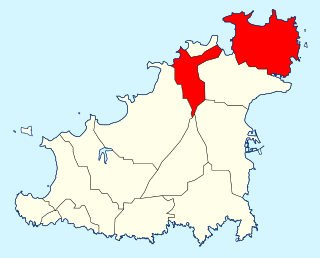
Vale is one of the ten parishes of Guernsey in the Bailiwick of Guernsey, Channel Islands.
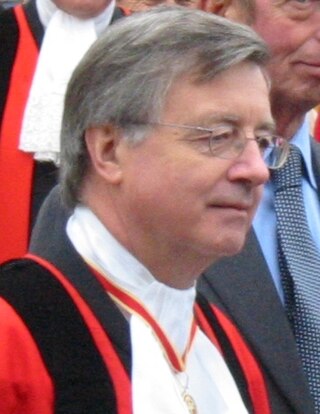
Sir Philip Martin Bailhache KC is a Jersey politician and lawyer who has served as a Deputy for St Clement since 2022 and the leader of the Jersey Liberal Conservatives party.

The States Assembly is the parliament of Jersey, formed of the island's 37 deputies and the Connétable of each of the twelve parishes.

The States of Guernsey, officially the States of Deliberation and sometimes referred to as the Government of Guernsey, is the parliament and government of the British Crown dependency of Guernsey. Some laws and ordinances approved by the States of Guernsey also apply to Alderney and Sark as "Bailiwick-wide legislation" with the consent of the governments of those islands. All enactments of the States of Guernsey apply to Herm as well as Guernsey, since Herm is directly administered by the Bailiwick of Guernsey.
Michael W. Torode was a Guernsey politician who was the second Chief Minister of Guernsey. The States of Deliberation voted him in on 5 March 2007 and his term expired on 30 April 2008.
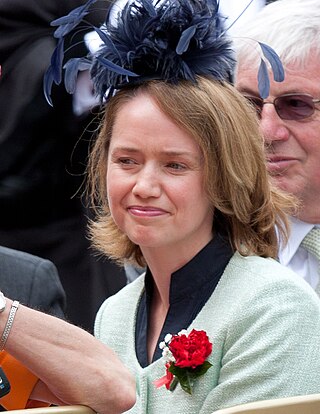
Kristina Louise Moore is a Jersey politician and former journalist who served as the Chief Minister of Jersey from July 2022 to January 2024.

Politics of Alderney takes place in a framework of a parliamentary representative democratic British Crown dependency, whereby the President of the States of Alderney is the head of government. Alderney is part of the Bailiwick of Guernsey but is largely self-governing.
The 2016 Guernsey general election was held on 27 April 2016 to elect 38 members of the States of Guernsey who will serve until 2020.

The Courts of Guernsey are responsible for the administration of justice in the Bailiwick of Guernsey, one of the Channel Islands. They apply the law of the Island, which is a mixture of customary law dating back as far as the 10th century and legislation passed by the legislature, the States of Deliberation.
The 2020 Guernsey general election took place on 7 October 2020 to elect 38 members of the States of Guernsey. Originally scheduled to be held in June 2020, it was delayed a year to 2021 due to the COVID-19 pandemic before being brought forward to its final date.
The COVID-19 pandemic in the Bailiwick of Guernsey was a part of the worldwide pandemic of coronavirus disease 2019 caused by severe acute respiratory syndrome coronavirus 2. The Bailiwick has been successful in limiting and preventing the spread of the virus through a rigorous system of testing, tracing and isolating suspected and confirmed cases and requiring arrivals to self-isolate for 14 days. The States of Guernsey co-ordinates the pandemic response which has been praised for its transparency and clarity and held up as an exemplar of good communication.
Future Guernsey, formerly Guernsey Partnership of Independents until November 2021, is a political party in Guernsey founded in August 2020 by Gavin St Pier, Heidi Soulsby and Lyndon Trott.
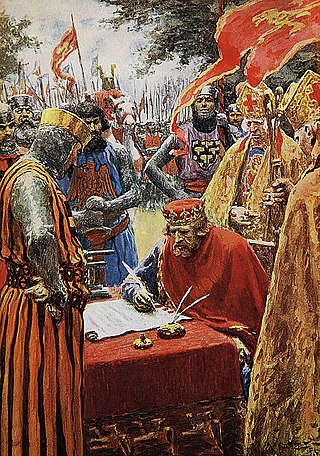
The Bailiwick of Jersey has an unwritten constitution arising from the Treaty of Paris (1259). When Henry III and the King of France came to terms over the Duchy of Normandy, the Norman mainland the suzerainty of the King of France. The Channel Islands however remained loyal to the British crown due to the loyalties of its Seigneurs. But they were never absorbed into the Kingdom of England by any Act of Union and exist as "peculiars of the Crown".
References
- 1 2 3 4 5 "Mary Lowe ends run of success after 26 years". Guernsey Press. 9 October 2020. Retrieved 20 April 2021.
- 1 2 3 4 5 "Guernsey Election: Eleven Deputies lose their seats". ITV News. 9 October 2020. Retrieved 20 April 2021.
- 1 2 "Mary's political low". Bailiwick Express. 9 October 2020. Retrieved 20 April 2021.
- ↑ "Vale Deputy challenges 'power station homes' development". Vale Parish Guernsey. 23 March 2019. Retrieved 20 April 2021.
- ↑ "Guernsey States decides department and committee roles". BBC News. 11 May 2012. Retrieved 20 April 2021.
- ↑ "'Fallagate put me off bench'". Guernsey Press. 7 March 2007. Retrieved 20 April 2021.
- ↑ "Mary May Lowe". Election 2020 Guernsey. Retrieved 20 April 2021.
- ↑ "Guernsey's Mother of the House is elected to Home board". BBC News. 30 January 2013. Retrieved 20 April 2021.
- 1 2 "Guernsey Home Affairs Committee president 'bullied staff', report says". BBC News. 24 June 2019. Retrieved 20 April 2021.
- ↑ "Deputy Mary Lowe: complaints 'totally unwarranted'". ITV News. 15 February 2017. Retrieved 20 April 2021.
- ↑ "Head of Home Affairs Deputy Mary Lowe urged to step down". BBC News. 28 June 2019. Retrieved 20 April 2021.
- ↑ "Calls for President of Home Affairs to resign in Guernsey". ITV News. 28 June 2019. Retrieved 20 April 2021.
- ↑ "The Results of the 2020 General Election". Election 2020 Guernsey. 11 October 2020. Retrieved 20 April 2021.